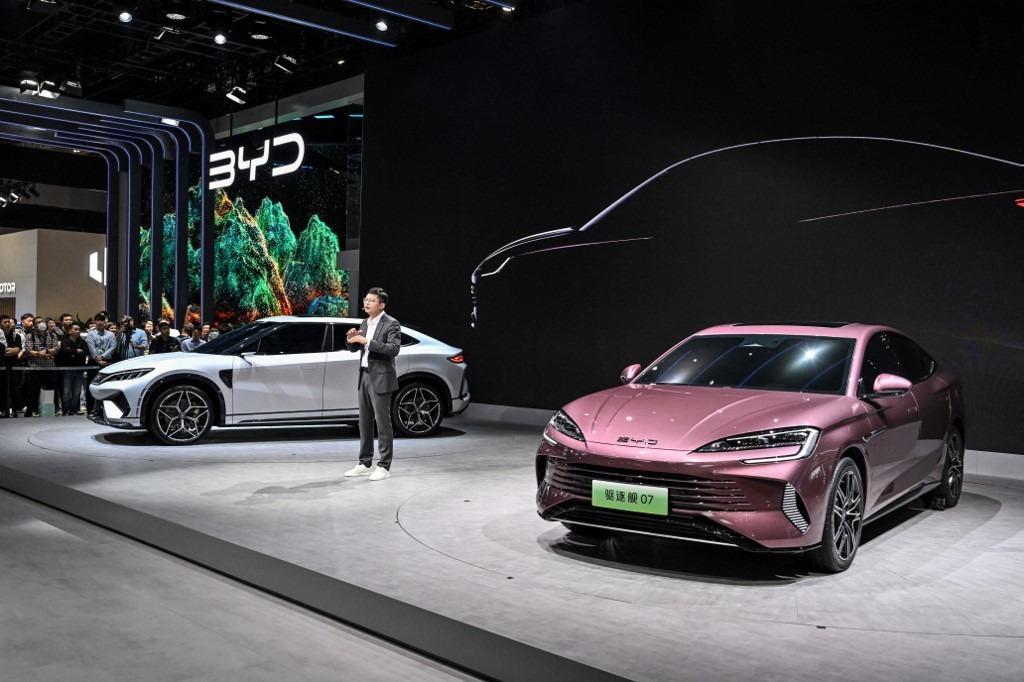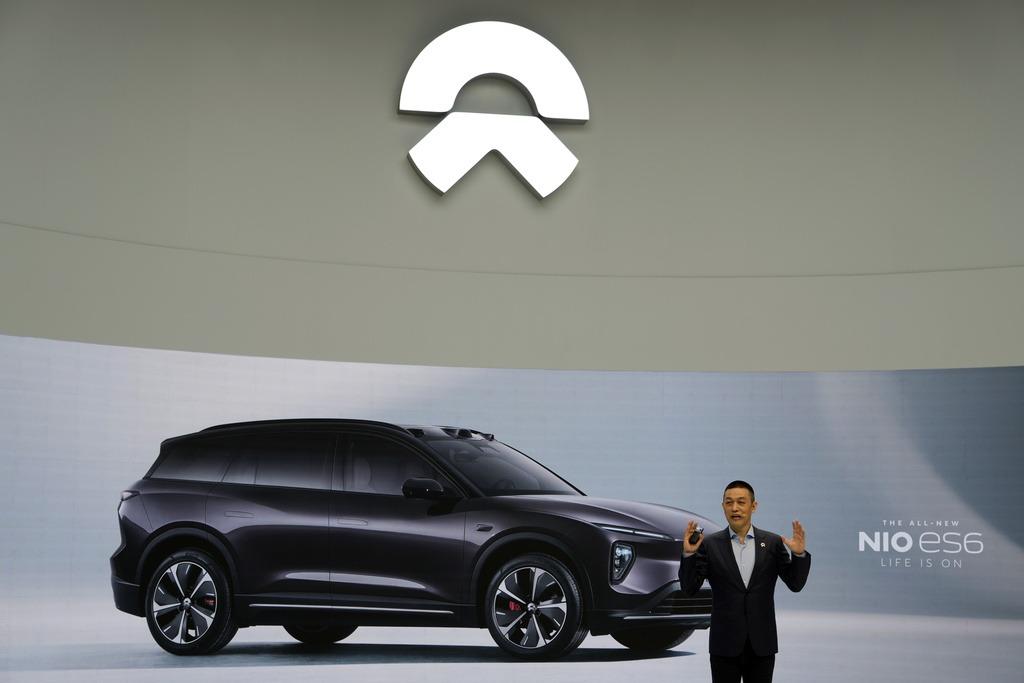 Visitors walk past an advertisement billboard for Mercedes-Benz as they head to the Auto Shanghai 2023 at the National Exhibition and Convention Center in Shanghai, China, on April 18, 2023. (PHOTO / AP)
Visitors walk past an advertisement billboard for Mercedes-Benz as they head to the Auto Shanghai 2023 at the National Exhibition and Convention Center in Shanghai, China, on April 18, 2023. (PHOTO / AP)
SHANGHAI - China's auto market, the world’s largest, is accelerating toward an electric future – leaving established global brands stuck in the slow lane.
When auto executives convene in Shanghai for the auto show starting Tuesday, they will return to a sharply different market from the one they left in 2021 when the industry gathered for a event during the COVID-19 pandemic.
The biggest change: China-made brands now lead in key segments and their rise has been powered by new electric-drive models that are gaining share at home and overseas.
Executives from Chinese automakers offered a reality check: the game is moving faster and the pressure to cut prices is getting more intense.
BYD’s sales in China are up almost 69 percent this year, giving it an 11 percent share of the overall car market, more than the Volkswagen brand or the Toyota brand, according to an analysis of sales data
The biggest winner has been BYD, which will use the Shanghai show to unveil a new hatchback electric vehicle (EV) for value-seeking buyers and a pricier EV styled as an SUV.
BYD’s sales in China are up almost 69 percent this year, giving it an 11 percent share of the overall car market, more than the Volkswagen brand or the Toyota brand, according to an analysis of sales data.
"The stratification of this market into clear winners and losers is becoming clear," Bill Russo, founder of consultancy Automobility said in a note issued on Tuesday. "And there are very few winners and a whole lot of losers."
China’s passenger car sales were down 13 percent in the first quarter, data from the China Passenger Car Association show.
ALSO READ: Global luxury carmakers bet on China's NEV market
But sales of EVs and plug-in hybrids – an area where Chinese automakers led by BYD now dominate – were up 22 percent. Sales of internal-combustion vehicles were down by an almost equal margin.
The result has been a double whammy for the likes of Volkswagen, General Motors, Honda and Nissan. Sales are down and so is market share.
 Fan Jihan, deputy director of exterior design of BYD Global Design Center, gives a speech during the presentation of BYD new cars at the 20th Shanghai International Automobile Industry Exhibition in Shanghai on April 18, 2023. (PHOTO / AFP)
Fan Jihan, deputy director of exterior design of BYD Global Design Center, gives a speech during the presentation of BYD new cars at the 20th Shanghai International Automobile Industry Exhibition in Shanghai on April 18, 2023. (PHOTO / AFP)
Price pressure
More than 40 auto brands have followed Tesla in cutting prices on EVs since January in a price war that has supported sales of EVs and plug-in hybrid electric vehicles (PHEVs), both of which are classed as “new energy vehicles” in China. It has also cut into industry-wide profitability, analysts say.
Both Toyota and VW's mass-market brands have lost share in China over the past year as the market shifted to EVs and plug-in hybrids where made-in-China brands, led by BYD, have moved faster
Volkswagen said at the show it would introduce 10 more EV models by 2026 and cut the time to develop new models by almost 40 percent to keep pace with faster-moving Chinese rivals.
"Our guiding principle is development in China for China at full speed," Thomas Schafer, chief executive of VW passenger car brands said.
Toyota, which has been slow to roll out electric vehicles, used the Shanghai show to unveil two new EVs, doubling the number on offer in China under its mainstream brand. It also introduced a Lexus-brand minivan, the "Luxury Mover," a hybrid designed to be chauffeur driven, a preference for many Chinese luxury car buyers.
Both Toyota and VW's mass-market brands have lost share in China over the past year as the market shifted to EVs and plug-in hybrids where made-in-China brands, led by BYD, have moved faster.
BMW, which plans to launch 11 EV models in China by the end of the year, said it had added features in response to the China market, like the rear-entertainment system in the i7 sedan.
“What moves Chinese customers today, moves the world tomorrow,” BMW CEO Olivier Zipse said.
ALSO READ: China, Europe cooperation fuels EV market
On Tuesday, BYD launched a hatchback-styled EV, the Seagull, that takes aim at the small car market that Toyota has long-dominated with models like the Corolla, a global best-seller. The price on the Seagull will start at the equivalent of just over $11,000
In a mark of that reversal, BYD outsold both Toyota and VW brand vehicles in the first quarter of this year in China.
On Tuesday, BYD launched a hatchback-styled EV, the Seagull, that takes aim at the small car market that Toyota has long-dominated with models like the Corolla, a global best-seller. The price on the Seagull will start at the equivalent of just over $11,000.
By comparison, Toyota's most popular EV on offer in China, the bZ4X, starts at over $29,000.
The 'final bastion' for combustion
For years, China’s entry-level market for passenger cars was dominated by combustion-engine cars made by global automakers in partnership with Chinese brands.
But for cars priced between $22,500 and $30,000, this year has been a wipeout for gasoline-only vehicles. Sales were down 20.5 percent in the first quarter, compared to a 68 percent gain for EVs and plug in hybrids.
BYD’s Song plug-in hybrid SUV, with a starting price of about $20,000, outsold the Nissan Sylphy, which had been China’s top-selling car for three straight years. BYD’s Dolphin EV, which starts at about $17,000, was ahead of the Volkswagen Passat.
 NIO chairman William Li unveils the es6, its new electric flagship SUV during the press day of the Auto Shanghai 2023 at the National Exhibition and Convention Center in Shanghai, China, on April 18, 2023. (PHOTO / AP)
NIO chairman William Li unveils the es6, its new electric flagship SUV during the press day of the Auto Shanghai 2023 at the National Exhibition and Convention Center in Shanghai, China, on April 18, 2023. (PHOTO / AP)
Because of the cost pressure on EVs from battery materials, the entry-level market is likely to be “the final bastion” for gasoline-only vehicles in China, Xu Haidong, deputy chief engineer at the China Association of Automobile Manufacturers said.
In China’s premium market, with prices between about $52,500 and $60,000, electric-drive cars are already the best sellers.
ALSO READ: SAIC's new EV to help China become leading vehicle export power
Because of the cost pressure on EVs from battery materials, the entry-level market is likely to be “the final bastion” for gasoline-only vehicles in China, Xu Haidong, deputy chief engineer at the China Association of Automobile Manufacturers said
BYD dominates China’s market for plug-in hybrids, cars that have a combustion engine but are capable of being charged and running for shorter distances on electric power.
Plug-ins represent more than half of BYD sales this year, giving the company scale to compete on price across its line-up, analysts say.
Tesla's 'heart and lungs'
Tesla saw a 27 percent increase in Chinese sales in the first quarter to just over 137,000 of its Model 3 sedans and Model Y crossovers. Tesla also increased share after cutting prices in China by between 6 perent and almost 14 percent in January.
That put starting prices for Teslas in China between $7,500 and about $10,700 lower than current US prices, which have also been discounted.
The Model Y, the US EV-maker's top seller globally ahead of its Model 3, is estimated to have a range of 545 km in China but starts at almost $40,000 in the country.
Nio founder William Li estimated the company and other automakers that manufacture primarily in China had as much as a 20 percent cost advantage over Tesla because of China's dominance over the supply chain and raw materials for battery-electric cars
Tesla, which has faced some pushback from Chinese consumers and some of its earliest fans for not introducing new models and features faster, opted to skip the Shanghai auto show this year.
Analysts and investors will focus on what that means for margins when Tesla announces first-quarter results on Wednesday.
“Gaining further share in the key China market will be the hearts and lungs of the Tesla growth story,” Wedbush analyst Daniel Ives said in a note on Monday.
Other Chinese auto executives underlined the pace and pressure to cut costs in a market where electric-drive cars now make up almost a third of new sales.
READ MORE: China NEV auto brands setting up plants overseas
Zhu Jiangmin, chief executive of privately held Leapmotor, offered a bold prediction on how low prices could go, a promising notion for consumers but threatening to automakers.
Within a decade, he said, he expected China to be able to sell a SUV-styled EV with a battery range of 400 km for around $7,500.
"The real situation is that the Model 3 was competitive in 2018, but not so competitive today, and it is normal for them to cut prices," Nio founder William Li told reporters. "You can get better cars for the same price in China."
Li estimated Nio and other automakers that manufacture primarily in China had as much as a 20 percent cost advantage over Tesla because of China's dominance over the supply chain and raw materials for battery-electric cars.


